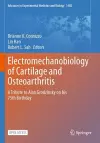
Electromechanobiology of Cartilage and Osteoarthritis
3 contributors - Paperback
£34.99
Brianne K. Connizzo, Ph.D., is an Assistant Professor at Boston University in the Department of Biomedical Engineering. She obtained her B.S. in Engineering from Smith College and her Ph.D. in Bioengineering from the University of Pennsylvania. She then completed her postdoctoral training with Dr. Alan Grodzinsky at the Massachusetts Institute of Technology. Her research interests center on multiscale mechanobiology and extracellular matrix homeostasis, specifically aimed at identifying how the maintenance of tissue properties is coordinated and controlled throughout life. Her research group at Boston University is making strides in identifying and decoupling initiating factors in age- and loading-related tissue damage in order to aid in the prevention of tendon and ligament injuries, develop and evaluate appropriate therapies, and advise regenerative medicine strategies. Dr. Connizzo was the recipient of an F32 postdoctoral fellowship and a K99/R00 Transition to Independence Award through the NIH National Institute on Aging, and recently received support from the American Association of University Women. In addition, Dr. Connizzo is the Chair of the Ambassadors Committee and Co-Founder of the Junior Faculty Network at the Orthopaedic Research Society.
Lin Han, Ph.D., is an Associate Professor in the School of Biomedical Engineering, Science and Health Systems at Drexel University. He obtained his B.E. from Tsinghua University in Beijing, P. R. China, and his Ph.D. from the Massachusetts Institute of Technology in the area of Bio- and Polymeric Materials under the mentorship of Dr. Alan Grodzinsky. After graduation, he worked as a quantitative analyst in Aristeia Capital, LLC, responsible for developing and testing statistical models. He then completed his postdoctoral training in the Department of Materials Science and Engineering and the Center for Biomedical Engineering at MIT. His current research aims to uncover the molecular mechanisms of extracellular matrix (ECM) proteoglycans and collagens in regulating the development, degeneration and regeneration of musculoskeletal tissues, and in turn, to develop new biomaterials and cell therapies to promote regeneration and disease intervention. Dr. Han was the recipient of National Science Foundation (NSF) CAREER Award, as well as the American Academy of Orthopaedic Surgeons (AAOS) Kappa Delta Young Investigator Award.
Robert L. Sah, Sc.D., M.D., is a Professor of Bioengineering at the University of California, San Diego and Professor of the Howard Hughes Medical Institute. He received his B.S. and M.S. in Electrical Engineering and the Sc.D. in Medical Engineering from the Massachusetts Institute of Technology, and his M.D. from Harvard Medical School. He completed his Sc.D. under the mentorship of Dr. Alan Grodzinsky and a year of post-doctoral research under the co-mentorship of Dr. Grodzinsky. He joined UC San Diego Bioengineering in 1992 and was promoted to Professor in 2001. His research addresses the multiscale biomechanics, mechanobiology, and tissue engineering of cartilage and joints in growth, aging, and osteoarthritis. Dr. Sah has received a Young Investigator Award (National Science Foundation), a Hulda Irene Duggan Investigator Award (Arthritis Foundation), three Kappa Delta Awards (American Academy of Orthopaedic Surgeons), and the Van C. Mow Medal (American Society of Mechanical Engineers). At UC San Diego, Dr. Sah served as Vice Chair of Bioengineering, and he is currently Co-Director of the Center for Musculoskeletal Research of the Institute of Engineering in Medicine. Dr. Sah is a Fellow of the Orthopaedic Research Society, the Biomedical Engineering Society, and the American Institute for Medical and Biological Engineering.